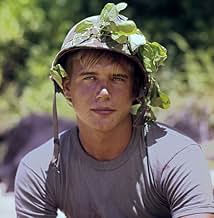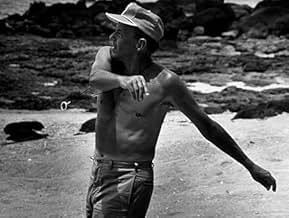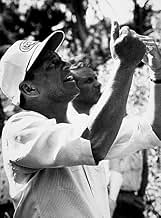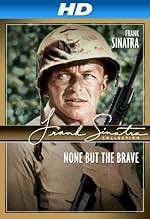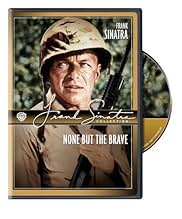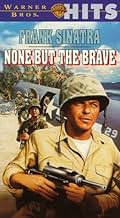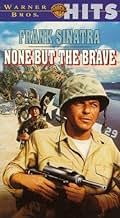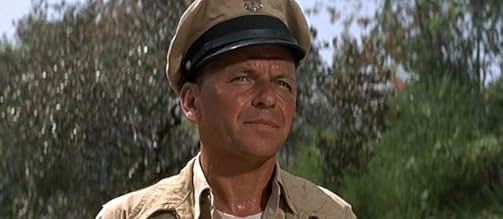IMDb-BEWERTUNG
6,4/10
2242
IHRE BEWERTUNG
Füge eine Handlung in deiner Sprache hinzuDuring WW2, a platoon of Marines crash-lands on a tiny Pacific island occupied by a small Japanese unit.During WW2, a platoon of Marines crash-lands on a tiny Pacific island occupied by a small Japanese unit.During WW2, a platoon of Marines crash-lands on a tiny Pacific island occupied by a small Japanese unit.
- Regie
- Drehbuch
- Hauptbesetzung
Takeshi Katô
- Sgt. Tamura
- (as Takeshi Kato)
Tôru Ibuki
- Pvt. Arikawa
- (as Toru Ibuki)
Ryûchô Shumpûtei
- Pvt. Okuda
- (as Ryucho Shunputei)
Empfohlene Bewertungen
In the midst of WWII, a pair of American transport planes (each full of Marines) is shot down. One (piloted by Walker) manages to crash land on a nearby uncharted island which happens to be inhabited by a small contingent of Japanese soldiers. Directed by Sinatra (in his one and only try), the film demonstrates the parallels and differences between these small units of soldiers on opposing sides and with varying backgrounds. Much of the film is devoted to the Japanese point of view as they are led by Mihashi (and most of it is presented in their native tongue with subtitles.) The rest concerns Walker, who takes charge of the remaining men, Sinatra, a boozy medic, Sands, a hopelessly eager upstart and Dexter, a grizzled Sergeant. Hostility between the enemies finally gives way to a sort of truce, or at least a cease-fire, until finally the men must live up to their country's expectations of eliminating each other. There's a lot of good in the film. It was an early example of showing more than one perspective with regards to enemies of America and it demonstrates, at times rather well, the ultimate futility and wastefulness of war. However, Sinatra, as a director, is in a bit over his head and the film is often static or choppy in it's narrative. There are also a ridiculous amount of scenes in which characters stay alive simply because either the enemy stops shooting (for no reason) or else misses by a mile. A lot of this could have been rectified in the staging of the battle sequences. Sinatra's role in the film is actually a supporting one, mostly consisting of one queasy, unbearably nerve-tingling sequence in which he is traded to the Japanese in order to perform surgery on one of their men. Otherwise, he is just onhand to provide the occasional snarky remark. Walker is a tower of virility and quiet strength. NO ONE wore a helmet like him or filled out their fatigues with more monument-like beauty. His enthralling baritone voice and piercing, ice-blue eyes make sitting through this film a little more enjoyable than it could have been without him. Sands is so unintentionally hilarious and so jaw-droppingly bad that his scenes ascend into some crazed, parodic comic stratosphere! WHAT was he thinking? It's like some teenage punk decided to portray a soldier the way he always dreamed of when in his sandbox as a child. His jaw, his posture, his accent.....all combine to create a memorably uproarious caricature. Dexter (the always-forgotten member of "The Magnificent Seven") has a couple of decent moments, notably in a conflict with Walker. Other soldiers are portrayed by healthy-looking, earnest actors who fit their roles well, though most of them don't get a chance to really shine. There are two very brief flashbacks by Mihashi and Walker that present the lady loves of their lives. Walker's is played (with hair and make-up that are about as 1940's as Sharon Tate in "Valley of the Dolls"!) by Stephens in her film debut. Though uneven, the film succeeds in presenting the enemy as human and in promoting the power of goodwill. The fact that Walker, in every frame, is breathtakingly handsome is gravy. (Oddly, he is pictured NOWHERE on the video box even though he is actually the leading man of the film!)
Can circumstances turn bitter enemies fighting for their countries into true friends? None But the Brave attempts to answer this question with a unique look at the relationship between two companies of enemy soldiers during World War II. This 1965 film is a character study of the two groups one American, the other Japanese. Marooned together on an island, they are forced into a reluctant cease-fire in order to help each other survive.
Frank Sinatra plays Chief Pharmacist Maloney, an alcoholic medic. As always, `Ol' Blue Eyes' shines with his great performance, proving how incredibly underrated he is as an actor. His co-stars are Tatsuya Mihashi as Lieutenant Kuroki and Clint Walker as Captain Bourke. The poignant story is told from the perspective of Kuroki, the ranking Japanese soldier. Mihashi performs brilliantly as a man driven to honor his country, but in his heart carries deep hatred for violence and `admires men's works. not their destruction.' Walker's portrayal as Bourke, an American soldier haunted by his past, is outstanding. Kuroki and Bourke's positions are paralleled throughout the film as they struggle to keep their men under control in the middle of nowhere.
Sinatra was more than one of the film's stars. In a bit of multitasking, he also produced and displayed his directing skills in his only directorial endeavor. It is very apparent that the filmmakers tried extremely hard to display fair portrayals of both sides. For instance, there were three writers, Kikumaru Okuda and Katsuya Susaki, both Japanese, and John Twist, an American.
It was surprising that John Williams, credited as Johnny Williams, composed the musical score for this film. This was a rare opportunity to see just how much is skills have evolved since 1965, which of course is to be expected. While the music was entertaining, it did not reach the caliber of most of his soundtracks from around 1974 and up.
This was an excellent motion picture. It gets all points for writing and acting. The directing was quite good. My only criticism is that some of the action scenes could have been more dynamic. Sinatra apparently decided to use a very straightforward approach with the camerawork. This resulted in somewhat stagnant feel to the battle scenes where a slightly different angle would have made all the difference. This may have been on purpose, as this was not a typical shoot 'em up, drag 'em out war film, but had a much more intelligent story.
7 out of 10
Frank Sinatra plays Chief Pharmacist Maloney, an alcoholic medic. As always, `Ol' Blue Eyes' shines with his great performance, proving how incredibly underrated he is as an actor. His co-stars are Tatsuya Mihashi as Lieutenant Kuroki and Clint Walker as Captain Bourke. The poignant story is told from the perspective of Kuroki, the ranking Japanese soldier. Mihashi performs brilliantly as a man driven to honor his country, but in his heart carries deep hatred for violence and `admires men's works. not their destruction.' Walker's portrayal as Bourke, an American soldier haunted by his past, is outstanding. Kuroki and Bourke's positions are paralleled throughout the film as they struggle to keep their men under control in the middle of nowhere.
Sinatra was more than one of the film's stars. In a bit of multitasking, he also produced and displayed his directing skills in his only directorial endeavor. It is very apparent that the filmmakers tried extremely hard to display fair portrayals of both sides. For instance, there were three writers, Kikumaru Okuda and Katsuya Susaki, both Japanese, and John Twist, an American.
It was surprising that John Williams, credited as Johnny Williams, composed the musical score for this film. This was a rare opportunity to see just how much is skills have evolved since 1965, which of course is to be expected. While the music was entertaining, it did not reach the caliber of most of his soundtracks from around 1974 and up.
This was an excellent motion picture. It gets all points for writing and acting. The directing was quite good. My only criticism is that some of the action scenes could have been more dynamic. Sinatra apparently decided to use a very straightforward approach with the camerawork. This resulted in somewhat stagnant feel to the battle scenes where a slightly different angle would have made all the difference. This may have been on purpose, as this was not a typical shoot 'em up, drag 'em out war film, but had a much more intelligent story.
7 out of 10
When you get right down to it, war is a pointless human endeavor. All it causes is death and destruction. When we use war to achieve a right event (such as the defeat of Nazism in World War II), it was often avoidable had some other peaceful action been taken earlier. Proper, humane treatment of Germany after World War I may have prevented the outbreak of World War II. "None But the Brave" is an earnest attempt to show that the differences between men in war can often be settled peacefully, and working together for mutual survival often assures peace and serenity.
The plot of the movie is rather straightforward. A plane carrying about a dozen American soldiers crashes on a small Pacific atoll, where the remnants of a Japanese garrison have been all but forgotten by their superiors. About equal in numbers, the two opposing parties attempt to fight it out, but then realize the hopelessness of confrontation, and instead form a peace in order to share fresh water, food, and medical supplies.
The two leads, Clint Walker ("The Dirty Dozen") and Tatsuya Mihashi ("Tora! Tora! Tora!") both shine in their roles. The two men are parallels: both have a sense of patriotism and devotion to their nation and the men under their command, yet both are humanists who see no point in destruction. During the truce, the two form a true friendship, coming to understand their respective backgrounds and personal life stories with respect and admiration for each other.
The supporting cast is generally filled with clichéd, familiar characters (a tough sergeant, a grizzled corporal, some inexperienced grunts, etc.), but the story really isn't about them. Tommy Sands ("The Longest Day") plays a green lieutenant out for blood, and his acting is far over the top. There's a story behind this, and it's unfortunate that his delivery strongly distracts from the story. Frank Sinatra has little to do, as he was busy in the director's chair, but there is a great extended scene revolving around a leg amputation where his limited dialog and great facial expressions more than deliver the goods. When Sinatra had substantial screen time, he used it well, but unfortunately he didn't give himself enough to do and his character is basically a waste of energy.
Director of Photography Harold Lipstein ("Hell is for Heroes") does a fantastic job with the Pacific locations. The steamy tropical jungle truly comes alive, especially during a fabulous scene in which a monsoon sweeps over the island. Sinatra's direction lacks flair, and most of the action sequences are straightforward and bland. The firefight revolving around a Japanese boat is also grim and gritty; and the final confrontation between the Japanese and Americans really delivers, mostly because of the blatant anti-war message which comes about 30 seconds after the shooting stops.
The movie features a rather boring score by John Williams (who was just starting to break into writing film scores in 1965; most of his work had been in television prior to this film). Eiji Tsuburaya (of "Godzilla") fame supervised the special effects work, and unfortunately, I have always found his work below-par when compared to some of the innovations Hollywood could afford during this period. There's a scene in which two model planes on strings blast away at each other in the same manner toy airplanes fired rockets at monsters as they attacked Tokyo. I can understand the Japanese cast and crew, since this was a joint production, but someone else should have been running the special effects department.
These are just minor nitpicks. Sinatra does a very good job directing this film and he has taken far too much criticism from other reviewers. The statements made in this film are bold and honest, and there are many moving moments. The final act is a brilliant exercise depicting the waste and futility of war. If everyone could not only watch, but understand the philosophy portrayed in this movie, perhaps the world would be a more peaceful place.
The plot of the movie is rather straightforward. A plane carrying about a dozen American soldiers crashes on a small Pacific atoll, where the remnants of a Japanese garrison have been all but forgotten by their superiors. About equal in numbers, the two opposing parties attempt to fight it out, but then realize the hopelessness of confrontation, and instead form a peace in order to share fresh water, food, and medical supplies.
The two leads, Clint Walker ("The Dirty Dozen") and Tatsuya Mihashi ("Tora! Tora! Tora!") both shine in their roles. The two men are parallels: both have a sense of patriotism and devotion to their nation and the men under their command, yet both are humanists who see no point in destruction. During the truce, the two form a true friendship, coming to understand their respective backgrounds and personal life stories with respect and admiration for each other.
The supporting cast is generally filled with clichéd, familiar characters (a tough sergeant, a grizzled corporal, some inexperienced grunts, etc.), but the story really isn't about them. Tommy Sands ("The Longest Day") plays a green lieutenant out for blood, and his acting is far over the top. There's a story behind this, and it's unfortunate that his delivery strongly distracts from the story. Frank Sinatra has little to do, as he was busy in the director's chair, but there is a great extended scene revolving around a leg amputation where his limited dialog and great facial expressions more than deliver the goods. When Sinatra had substantial screen time, he used it well, but unfortunately he didn't give himself enough to do and his character is basically a waste of energy.
Director of Photography Harold Lipstein ("Hell is for Heroes") does a fantastic job with the Pacific locations. The steamy tropical jungle truly comes alive, especially during a fabulous scene in which a monsoon sweeps over the island. Sinatra's direction lacks flair, and most of the action sequences are straightforward and bland. The firefight revolving around a Japanese boat is also grim and gritty; and the final confrontation between the Japanese and Americans really delivers, mostly because of the blatant anti-war message which comes about 30 seconds after the shooting stops.
The movie features a rather boring score by John Williams (who was just starting to break into writing film scores in 1965; most of his work had been in television prior to this film). Eiji Tsuburaya (of "Godzilla") fame supervised the special effects work, and unfortunately, I have always found his work below-par when compared to some of the innovations Hollywood could afford during this period. There's a scene in which two model planes on strings blast away at each other in the same manner toy airplanes fired rockets at monsters as they attacked Tokyo. I can understand the Japanese cast and crew, since this was a joint production, but someone else should have been running the special effects department.
These are just minor nitpicks. Sinatra does a very good job directing this film and he has taken far too much criticism from other reviewers. The statements made in this film are bold and honest, and there are many moving moments. The final act is a brilliant exercise depicting the waste and futility of war. If everyone could not only watch, but understand the philosophy portrayed in this movie, perhaps the world would be a more peaceful place.
Over in the trivia section of the IMDb there is a submission that reads something like..."When he (Tommy Sands)divorced Frank's kid (her name is Nancy), Sinatra allegedly saw to it that his (Sand's) career went permanently on the rocks"...or something like that. Statements like that should be followed by telling exactly just how this was accomplished. This film, "None But the Brave" may contain the answer. It was directed (none too well at that) by Mr. Sinatra, and Mr. Sands, in every scene he is in and every line he speaks, gives the most shrill, bizarre, over-the-top, irritating,mind-boggling, irksome, get-the-hook, somebody-please-shoot-him performance ever seen in a movie that had a budget of over $1200. He was not good enough as an actor to have been that bad on purpose. He was not good enough of an actor to have been that bad accidentally. Only a director on a mission can take a performer to the depths reached by Tommy Sands in this film. Thanks a lot, Dad.
Like its better known cousin HELL IN THE PACIFIC, NONE BUT THE BRAVE is a story about US and Japanese troops stranded on a desert island during WW2. It's a tense and highly watchable tale that makes Frank Sinatra's sole directorial credit, and he also co-stars in the movie as the medic of the group.
The tale is quite low key and more of a character piece than an action film. There are action scenes here, but they're few and far between and low budget. Nonetheless the film looks classy and expensive with fine cinematography that brings the lush locations to life. As an anti-war piece of filmmaking, it ploughs much the same furrow as HELL IN THE PACIFIC, exploring the way in which all soldiers are the same and the parallels between the two units despite their utmost grievances.
There are some exemplary performances amid the cast members. Clint Walker is exceptional as the nominal group leader and Tatsuya Mihashi his equal as his Japanese rival. Sinatra himself gives an understated performance but the set-piece involving the amputation is the tensest and best in the whole film, a minor acting masterclass from the star. Only Tommy Sands falls apart with a turn that could best be described as a caricature of a real person.
The tale is quite low key and more of a character piece than an action film. There are action scenes here, but they're few and far between and low budget. Nonetheless the film looks classy and expensive with fine cinematography that brings the lush locations to life. As an anti-war piece of filmmaking, it ploughs much the same furrow as HELL IN THE PACIFIC, exploring the way in which all soldiers are the same and the parallels between the two units despite their utmost grievances.
There are some exemplary performances amid the cast members. Clint Walker is exceptional as the nominal group leader and Tatsuya Mihashi his equal as his Japanese rival. Sinatra himself gives an understated performance but the set-piece involving the amputation is the tensest and best in the whole film, a minor acting masterclass from the star. Only Tommy Sands falls apart with a turn that could best be described as a caricature of a real person.
Wusstest du schon
- WissenswertesDuring downtime whilst shooting the picture, Brad Dexter saved Frank Sinatra from drowning when he dived into the ocean and rescued the floundering singer.
- PatzerOne African American belongs to the USMC platoon. At this time, US military was not an integrated military and Blacks were segregated. This black Marine couldn't have been a member of this platoon. The USMC was integrated in World War II, as according to the Marine hierarchy, "There is only one color in the USMC, Marine Corps green."
- Zitate
Lt. Kuroki: Our island is a little chunk of coral in the Sakhalin archipelago. It is nameless and the Great War beyond its horizons ignores us, for we are the expendables of an amphibious landing, left to God, a forgotten outpost of the Imperial Japanese Army.
- Crazy CreditsThe line NOBODY EVER WINS appears in place of "The End" just before the end credits start, which is appropriate given the film's anti-war message.
- Alternative VersionenSome prints of the film do not include subtitles for any of the Japanese sequences.
- VerbindungenFeatured in Legenden der Leinwand: Frank Sinatra (2011)
Top-Auswahl
Melde dich zum Bewerten an und greife auf die Watchlist für personalisierte Empfehlungen zu.
Details
- Erscheinungsdatum
- Herkunftsländer
- Sprachen
- Auch bekannt als
- Los valientes mueren de pie
- Drehorte
- Produktionsfirmen
- Weitere beteiligte Unternehmen bei IMDbPro anzeigen
- Laufzeit
- 1 Std. 46 Min.(106 min)
- Seitenverhältnis
- 2.35 : 1
Zu dieser Seite beitragen
Bearbeitung vorschlagen oder fehlenden Inhalt hinzufügen



